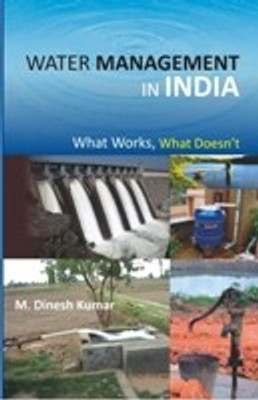Water Management in India(English, Paperback, Kumar M. Dinesh)
Quick Overview
Product Price Comparison
The Book Deals With Some Of The Most Debated, Yet Unresolved Questions Regarding Water Management Options For India And Several Other Developing Economies. It Argues That There Are Serious Knowledge Gaps About What Solutions Work And Under What Conditions. It Challenges The Received Wisdom About The Potential Of Some Of The Water Management Solutions In Popular Parlance. It Also Questions The Skeptical Pessimism About The Feasibility Of Some Of The More Classical Approaches. The Water Management Options Being Investigated Are: Roof Water Harvesting For Domestic Water Security; Local Water Harvesting And Groundwater Recharge; Virtual Water Trade; Micro Irrigation For Water Demand Management In Agriculture; Pricing Of Electricity For Regulating Groundwater Pumping; And Creating Large Water Storages For Ensuring Sustainable Water Use. In The Process, The Book Attempts To Explode Certain Myths About What Can Solve India's Water Scarcity Problems. This Book Will Be Useful For Policy Makers, Academics, Practitioners, Researchers And Students In The Area Of Water Management., M. Dinesh Kumar Is A Ph.D. In Water Management, And Has More Than 18 Years Of Professional Experience In Research, Action Research And Consulting In The Field Of Water Resources. He Is Currently Heading A National Level Non-Profit Research Institute Named Institute For Resource Analysis And Policy In Hyderabad. During 2001-2008, He Worked With The International Water Management Institute, And Headed The Iwmi-Tata Water Policy Research Programme During The Last Year Of His Tenure. He Has Nearly 100 Publications To His Credit, Including Book Chapters, Journal Articles, Research Monographs And Conference Papers. He Has Published Extensively In Many International Peer Reviewed Journals On Water On Some Of The Most Crucial Topics Such As Energy-Groundwater Nexus, Global Virtual Water Trade, Rain Water Harvesting And Artificial Recharge, Economic Valuation Of Water In Agriculture, And Socio-Economic Impacts Of Large Dams. His First Book Published In 2007 Was On Groundwater Management. He Was The Lead Author Of The White Paper On Water In Gujarat, Prepared By The Institute Of Rural Management Anand In Collaboration With Unicef, India For The Government Of Gujarat In 2001. He Is Also The Member Of The Board Of The Society For Integrated Land And Water Management, An Organization Working On Groundwater Management In India., Content:- Contents, Preface 9, 1. Introduction 13, Water Crisis In IndiaDebates On Water, Management AlternativesCurrent Gaps In The, Debates On Water ManagementPurpose And, Scope Of The Book., 2. Can Roof Water Harvesting Ensure, Domestic Water Security ? 31, AbstractGrowing Drinking Water Crisis In, IndiaRoof Water HarvestingThe Scope And, Impact Of Roof-Water HarvestingHydrological, Opportunities For Roof Water Harvesting In, Urban AreasHydrological Opportunities For, Roof Water Harvesting In Rural AreasPhysical, Feasibility For Roof Top Water Harvesting In, Urban And Rural AreasCost And Economics Of, Roof Water Harvesting SystemsPractical And, Policy ImplicationsConcluding Remarks., 3. Rainwater Harvesting And Groundwater, Recharge In Water Scarce Regions Of India :, Potential And Pitfalls 67, AbstractIntroductionObjectives And, ApproachCritical Issues In Rainwater, Harvesting And Groundwater RechargingLack, Of Emphasis On Local Water Demand And, Potential SuppliesLimitations Imposed By, Hydrological RegimesLimitations Imposed By, Socioeconomic SystemCosts And Economics Of, Water Harvesting And Recharge SchemesLack, Of Integrated ApproachTrade Off Between Local, Vs Basin Impacts In Closed BasinsTrade Off, 6 Water Management In India, Between Economics And Hydrological, OpportunityMaximizing Local Benefits Vs, Optimum Benefits For Basin Communities, Major FindingsConclusions., 4. Using Power Tariff As A Tool To Manage, Groundwater In Over-Exploited Area 117, IntroductionObjectives And Hypothesis, Approach And MethodologyStudy Area, Sampling Procedure And Data Collection, MethodologyEstimating Water Productivity Of, Farming SystemImpacts Of Different Modes Of, Energy Pricing On Equity In Access To, GroundwaterResults And Discussion, Distribution Of Land HoldingsCost Of, Groundwater IrrigationCropping Pattern In, Eastern UpCropping Pattern In North, GujaratCropping Pattern In South Bihar, Results And DiscussionIrrigation Water, Application And Crop Water Productivity, Eastern Up: Electric PumpsEastern Up: Diesel, Well CommandsNorth Gujarat: Flat And Unit, Energy Pricing RegimesLivestock Water, ProductivityFeed And Fodder UseAverage, Milk ProductionWater Use For Milk, ProductionNet Water Productivity In Economic, TermsFarm Level Water ProductivityEquity, In Access To GroundwaterGroundwater, Pumping By FarmersImportant Findings, ConclusionsDirections For Policy., 5. When Do Micro Irrigation Technologies, Become The Best Bet Technolgoies ? 167, AbstractIntroductionAvailable Water-Saving, And Yield Improving Irrigation Technologies In, Indian Agriculture And Their Potentials, Contribution Of Micro-Irrigation Technologies In, Indian AgriculturePresent Spread Of Microirrigation, Technologies In Indian Agriculture, Contents 7, Potential Contribution Of Micro-Irrigation, Technologies In IndiaPhysical Impact Of Microirrigation, Technologies On Water Demand For Crop, ProductionPhysical Constraints And, Opportunities For Adoption Of Mi SystemsSocioeconomic, And Institutional Constraints For Mi, AdoptionReal Water Saving And Water, Productivity Impacts Of Mi Systems In The, FieldPotential Aggregate Impact Of Mi Systems, On Water Use For Crop ProductionEconomic, Impacts Of Mi SystemsPotential Future, Benefits From Micro-Irrigation Technologies, Crops Conducive To Micro-Irrigation Technologies, Water-Scarce River Basins That Can Benefit, From Micro-Irrigation TechnologiesArea That, Can Be Brought Under Mi Technologies In Major, Indian StatesBasins And Cropped Area, Conducive To Adoption Of Micro-Irrigation, TechnologiesQuantification Of Potential Future, Impact Of Mi Systems On Water Requirements, Major FindingsInstitutional And Policy, Alternatives For Spreading Micro-Irrigation, TechnologiesConclusions., 6. Can Virtual Water Trade Be A Penacea, For Global And Regional Water Scarcity, Problems? 241, AbstractVirtual Water Trade Changing The, Global Debate On Water ScarcityThe Study, Objectives And MethodologyData Sets,, Analyses And DiscussionDoes Renewable, Water Availability Influence Virtual Water, Trade?Does Arable Land Control Virtual Water, Trade Dynamic?Relation Between Access To, Arable Land And Water RichnessRethinking, On Global Food And Water Security Challenges, Virtual Water Trade Vs Regional Water, TransfersMajor Findings Of The Study, Conclusions And Policy Implications., 7. Why We Should Invest In Water, Infrastructure And Institutions 277, AbstractIntroductionObjectives And, HypothesisAnalysis And Data SourcesWater, And Economic GrowthCan Economic Growth, Drive Water Security?Storage Development, And Economic GrowthImpact Of Storage, Development On HungerSummary Of, FindingsConclusions., 8. Summary And Conclusions 309, Bibliography 319, Index 339


